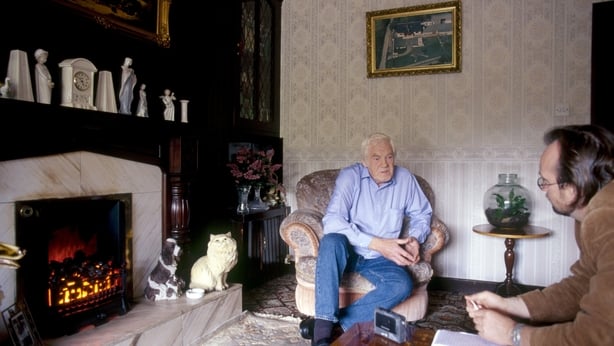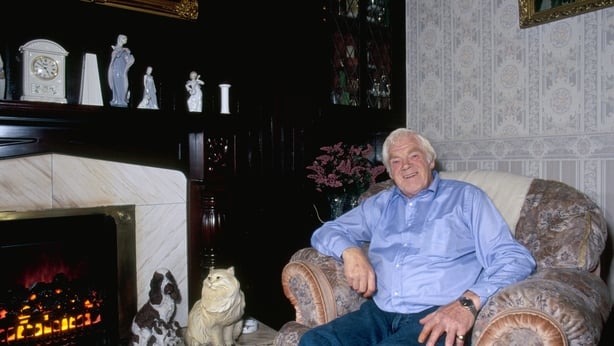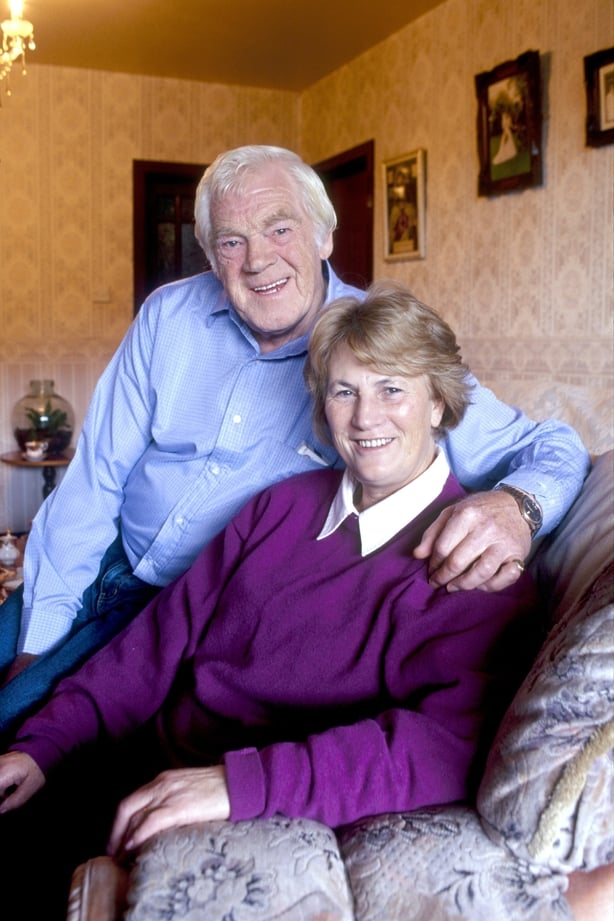"I never claimed to be the King," declared Big Tom McBride in October 2004, in an interview at home with the RTÉ Guide's Donal O'Donoghue which reviewed his illustrious career in Country music. To mark the passing of the Irish music legend, we republish the interview below.
He was the King: the big man with the rhythm guitar, three-piece suit and gravelly voice. For forty years they threw their underwear at him and he sent them home sweating. That was the dance band deal and Big Tom McBride did it better than anybody else.
When Susan McCann recorded Big Tom is Still the King in 1977 it became her first number one hit: a double-sided compliment. Then last month Big Tom and the Mainliners played a series of sell-out comeback shows. The King was back: albeit one reluctant to wear the crown.
"I never claimed to be the King but people called me that," McBride says. "If they want to call me that, that's fine. But I'm just another singer: there's no royalty in this house."
This house is just outside Castleblayney in Co Monaghan. You know Big Tom's place by the wrought-iron gates: two guitars on either side with BIG and TOM on opposing halves. A local man - and fan - gave them as a gift to the singer many moons ago in the early 70s. Since then they have appropriated their own legend. Two years ago, a few lads attempted to steal them: a drunken prank that backfired and resulted in a protracted court case. "Shure, where would you be going with them done?" asks Big Tom with a perplexed look. This sense of wonder at his own fame - he was the biggest Country and Irish star ever - informs an easygoing attitude to his celebrity.

The way he sees it is quite simple: he was, and is, a lucky local lad who done well.
We meet in his living room: mantlepieced with trophies, old photographs and awards. McBride's still a big man: if slightly bowed by age. "I'm eighty-four," he says jokingly before adding: "I'm on the wrong side of sixty, anyway."
He offers a large farmer's hand and is wearing a newly pressed check shirt and a pair of blue jeans: the dress of the cowboy at rest. His face is a fractured map: streets of wrinkles scored from years of intensive touring and performing. At one time Big Tom estimates he played 57 shows in a row. Being on stage, he says, was "no bother", but the travelling eventually got to him: a thousand dancehalls, a million miles, a trillion encores.

All that history is etched on his face: but when he smiles the years melt away and like some Dorian Gray, waiting in the wings, the dance band king returns.
"You still have that old twinkle," the photographer says. "Ah, no - ", says Big Tom with a loose shrug of his shoulders, "that is gone now, too." But don't believe him. The recent series of sell-out shows - his first in nearly three years - attest to the fact that whatever it was he had, he still has it.
So what was it like being a sex symbol, Big Tom? The big man leans back and laughs. "I wasn't a sex symbol, definitely not," he says. "I'd say it was more the songs that we did. People liked them. I wasn't a sex symbol at all. I never thought of myself that way." What about the groupies? "A lot of people would follow you, there is no doubt about that," he concedes. "They would travel from all over the country. But were they after me or after the songs? I always liked to put it down to the fact that they liked the music that we did."
McBride's father, Samuel, was Protestant and his mother, Mary Ellen, was Catholic. They had six children, two girls and four boys, of whom four survived into adulthood. In the early days, Big Tom remembers the social hub that was their home: the gramophone wheezing out the '78 sounds of Jimmie Rodgers, the gang dancing around the kitchen, and his father, who "sang a bit". He was not a big fan of school and regularly mitched from class. "I was a bad boyo when I was at school, I'll tell you that," he says. Eventually at 14 he got out for good.

In his late teens he and a mate worked in Scotland, and later London, where they bought a guitar for £12. They knew some tunes and picked up other numbers from Irish lads living in the digs of Kilburn. He moved to Jersey in the Channel Islands where in 1959 he got word from home. His older brother, Willie John, had died of meningitis, after getting injured in a fall from a bicycle 12 months earlier. For the only time the big man's eyes mist with a long ago memory.
"He got the pains in his head again and eventually it killed him. There was no one else at home except my mother and father." So Tom McBride came back to 'Blayney to look after the farm.
I suspect that Big Tom (the name derives from his GAA playing days) puts his life into his singing. "I often call myself a singer of sad songs," he once said. "Or a sad singer of sad songs. We're a sentimental race of people." For this he has been crowned the sultan of sentimentality and been venerated and vilified in equal measure. I also suspect that he gets the joke about himself: but he knows that his popularity in the fiefdom of Country and Irish music is rooted in something primal and parochial.
"I never really believed in myself going on stage," he says. "I always wondered why people were coming to see us and I always had the butterflies. But when you see people are enjoying themselves it's easy after that."
At the beginning of the 60s, McBride joined the Finncairn Céilí Band which evolved into the Mainliners - reflecting the non-traditional music they were increasingly playing.
Tom McBride came up with the name. "I probably stole that from a little country band in Jersey," he says with a grin. The band proved popular at the dancehalls throughout the county and beyond. The manager was John McCormick who, when asked how the band were doing, replied that they would be grand if they could get rid of the big eejit of a guitar player. "Oh that's a true story alright," he says. Was McCormick joking? "Nobody knows."
Over the years countless tall tales have been pinned to Big Tom's satin-trimmed lapels. Most are amusing but apocryphal, including the infamous one where Big Tom and The Mainliners supposedly played a gig in the US to a hardcore crowd expecting a venue-trashing punk crew.
"No, that never happened," says the main Mainliner. "I heard that story umpteen times and we did play America but I didn't see any of those people at any of the shows looking to see if we were druggies or that."

The turning point was the band's appearance on The Showband Show, a top-rated TV programme where alongside such established performers as Larry Cunningham and Joe Dolan, newcomers Big Tom and the Mainliners played Gentle Mother. Afterwards, the RTÉ switchboard was jammed with people enquiring about the band and subsequently Gentle Mother became their first single. "It wasn't an overnight hit, but it remains as popular today as it was back then." The rest, as McBride puts it without any spin or irony, is history.
For the 'family photograph' - Big Tom's four children are now grown up with their own families - Rose sits with her husband. Behind them on the wall is a photograph of their wedding day in 1964 - a black and white image snapped at the reception in Castleblayney.
It is a faded memory of youth: Big Tom, a fresh-faced fellow two years shy of becoming a major star, with his childhood sweetheart. At the end of September the couple celebrated their 40th anniversary and in that time the statistics have stacked up.
Big Tom was the first Irish recording artist to sell 50,000 albums; he scored a bag of number one hits and he and Rose have four children and six grandchildren. Most Monday nights, the man himself still sings a few songs in their bar, The Old Log Cabin, in the town.
"I could have finished up being a farmer or a carpenter," Big Tom says. "But things happen in life. We never set out to be a big band. It's just one of those things that happen. We did it for the craic and it happened."

